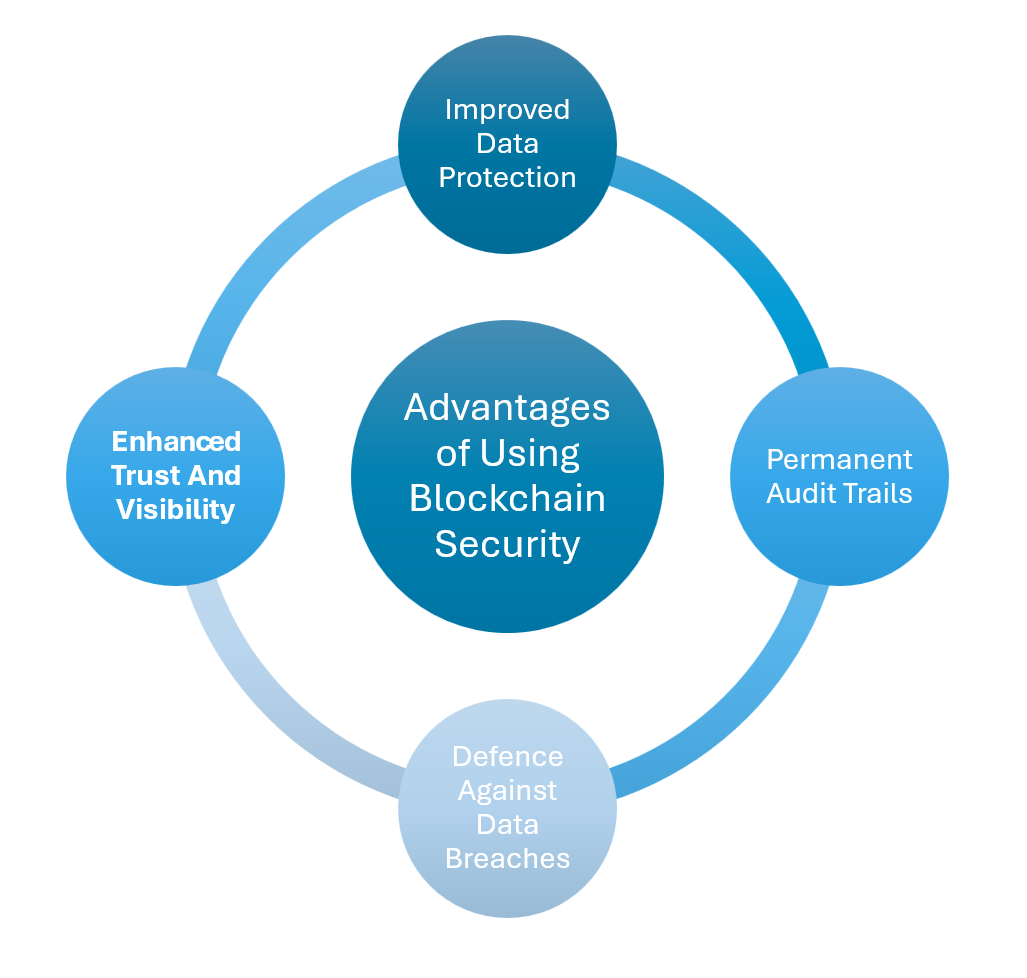Introduction
As technology advances, the security threats linked to mobile apps are also evolving. Cyberattacks and data breaches are increasingly prevalent, putting both companies and users at risk. However, the rise of blockchain technology has emerged as a robust solution to tackle these security challenges. Blockchain development is transforming the landscape of application security, delivering improved protection, transparency, and trust. In this article, we will examine the advantages of blockchain technology in mobile app development and its impact on enhancing app security, creating a more secure digital environment for both businesses and users.
The necessity for improved app security in the current digital environment
In the present digital environment, where technology is omnipresent and mobile apps have become essential to our everyday activities, the necessity for improved app security has reached unprecedented importance. As we increasingly depend on mobile applications for tasks such as banking, shopping, and communication, the risks tied to unauthorized access and data breaches have surged significantly.
Cybercriminals and hackers consistently target mobile applications, taking advantage of system vulnerabilities to illegally access sensitive user data. The fallout from these attacks can be devastating for both companies and their customers, resulting in financial setbacks, damage to reputation, and a breakdown of trust.
Conventional security approaches, including firewalls and encryption, have shown to be inadequate in addressing these constantly changing threats. This is where blockchain technology can step in, providing a strong and decentralized answer that can transform app security.
Stay tuned for the following section as we explore in greater detail how blockchain technology can enhance app security by mitigating vulnerabilities, guaranteeing transparency, and building trust in the digital space.
Grasping the fundamentals of blockchain technology and its potential impact on app security
Blockchain technology, often linked with cryptocurrencies such as Bitcoin, is a decentralized and distributed ledger framework that logs transactions across numerous computers. Each transaction is incorporated into a block, which is subsequently connected to the previous block, forming a chain of information that is nearly impossible to alter.
A major advantage of blockchain technology in app security is its capability to mitigate vulnerabilities. In contrast to conventional centralized systems that depend on a single point of failure, blockchain functions on a network of computers, thus being highly resilient to hacking attempts. This decentralized structure guarantees that even if one computer is breached, the data remains safeguarded on the other systems within the network.
Besides its strong security features, blockchain technology also improves transparency. Every transaction entered into the blockchain is accessible to all participants, establishing a transparent environment where any dubious activity can be readily recognized and addressed.
Moreover, blockchain promotes trust in the digital space. Due to its immutable and transparent characteristics, blockchain removes the necessity for intermediaries and third parties, thereby diminishing the potential for fraud or manipulation. Users can trust the accuracy and integrity of the information stored on the blockchain, increasing their confidence in the app and the organization that supports it.
In the following blog section, we will examine the particular uses of blockchain technology in app security, showcasing real-world instances of its application and the advantages it provides across different industries. Stay tuned as we explore the revolutionary potential of blockchain in app security.

Key advantages of utilizing blockchain for application security
As mentioned in the previous section, blockchain technology provides several benefits regarding application security. Let’s examine some of the primary advantages:
- Improved data protection:
By decentralizing how information is stored and processed, blockchain technology removes single points of failure, making it highly challenging for hackers to access data without authorization. The cryptographic methods employed in blockchain maintain data integrity and confidentiality, creating a secure space for safeguarding sensitive application information. - Permanent audit trails:
Each transaction logged on the blockchain is stored indefinitely and cannot be modified or erased. This results in a permanent audit trail, enabling developers and administrators to monitor and authenticate every action performed on the application. This capability is especially vital in sectors with stringent regulatory compliance obligations, such as finance and healthcare. - Defense against data breaches:
In contrast to conventional centralized systems, where a single breach can compromise large amounts of sensitive information, blockchain operates through a network of computers. Consequently, an attacker would need to infiltrate multiple nodes simultaneously to access the entire system, thereby significantly lowering the chances of widespread data breaches. - Enhanced trust and visibility:
The transparent nature of blockchain ensures that all actions and transactions on the application are accessible to all stakeholders. This visibility promotes trust among users, as they can validate the application’s integrity and confirm that their data is securely managed. Furthermore, by removing the necessity for intermediaries, blockchain technology diminishes the opportunities for fraud and manipulation.
In the following section, we will explore specific industries that have successfully adopted blockchain technology for application security and the effects it has had on their operations. Stay tuned to learn how blockchain is reshaping the field of application security!
Challenges and considerations in implementation
Implementing blockchain technology to enhance app security presents various challenges and considerations. While the advantages of blockchain are clear, it is essential for businesses to thoroughly assess these factors before moving forward with implementation.
One of the primary challenges is scalability. Blockchain networks tend to be slower in processing transactions compared to traditional centralized systems, which raises concerns for applications that require high transaction throughput or real-time processing. Identifying ways to enhance the speed and scalability of blockchain networks is a vital consideration for businesses contemplating blockchain adoption.
Another aspect to consider is cost. The implementation of blockchain technology often necessitates a substantial financial investment, particularly for businesses needing to develop their own blockchain infrastructure. Moreover, ongoing upkeep, upgrades, and security measures contribute to the overall expenditure.
Additionally, businesses must take into account the legal and regulatory ramifications. As blockchain technology is still relatively recent, the laws and regulations governing it are continuously evolving. Companies need to ensure they comply with current legislation and keep abreast of any emerging regulations that might affect their use of blockchain technology.
In spite of these challenges, numerous industries are successfully adopting blockchain for app security and obtaining impressive outcomes. In the subsequent section, we will examine some of these sectors and explore how blockchain has reshaped their cybersecurity environment. Stay tuned to learn about the thrilling advancements!
Case studies: Practical examples of blockchain improving app security
In this segment, we will delve into some practical examples that illustrate how blockchain has altered the app security landscape. These instances highlight the capabilities of blockchain technology and offer insights into the advantages it delivers across various sectors.
To begin with, let’s look at the finance sector. Financial institutions and banks have begun to adopt blockchain for improved security in transactions and data management. By integrating blockchain, they have notably diminished the risk of fraud and unauthorized access, providing secure and transparent transactions for their clients.
The healthcare sector is another field that has adopted blockchain for app security. Its ability to maintain secure, unchangeable records has transformed data sharing and safeguarded patient privacy. Electronic health records are securely stored and exchanged among healthcare providers, which streamlines patient care and decreases the likelihood of data breaches.
Furthermore, supply chain management has also benefited from the influence of blockchain technology. By utilizing blockchain, businesses can guarantee complete traceability, thwarting counterfeiting and enhancing transparency throughout the supply chain. This builds trust between companies and consumers, thereby improving app security.
These case studies underline how blockchain has instigated significant changes in app security across different industries. In the next segment, we will examine the specific mechanisms through which blockchain technology bolsters security in each sector and discuss the future potential applications of this technology. Stay tuned for a comprehensive analysis!
Unlock the power of blockchain’s security for your mobile application.
Future prospects and potential advancements in blockchain-based app security
As previously discussed, blockchain has already made remarkable progress in enhancing app security across various sectors, including finance, healthcare, and supply chain management. But what lies ahead for this technology? In this part, we will examine the possible improvements and future opportunities of blockchain-based app security.
A significant area of potential is identity management. Through blockchain, individuals can maintain complete control over their personal data and decide with whom to share it. This decentralized method reduces the likelihood of data breaches and offers a more secure means of verifying identities, particularly during digital transactions and authentication procedures.
Furthermore, blockchain-based app security can be vital in protecting Internet of Things (IoT) devices. By utilizing blockchain technology, IoT devices can securely communicate with one another, ensuring that the data exchanged between devices is tamper-proof and safeguarded against unauthorized access.
In addition, smart contracts enabled by blockchain could transform app security in domains such as legal agreements, intellectual property rights, and digital rights management. These self-executing agreements ensure the automated enforcement of terms and conditions, which diminishes the chances of conflicts and guarantees secure transactions.
In the following section, we will explore these potential advancements in greater detail and discuss their impact on the future of app security. Stay with us to discover more about the promising future of blockchain technology in protecting applications from various security threats.
Conclusion: Adopting blockchain for enhanced app safety
To sum up, the outlook for app security is bright with the adoption of blockchain technology. Ranging from managing identities to securing IoT devices and utilizing smart contracts, blockchain has the capability to transform the methods we use to safeguard our applications and data.
By adopting blockchain, users can gain more control over their personal data, significantly reducing the chances of data breaches and unauthorized access. The immutable nature of blockchain guarantees the safety of information exchanged between IoT devices, enhancing the security and reliability of communications.
Moreover, the automated and self-executing features of smart contracts open up opportunities for more secure and efficient app transactions, lowering the risks of conflicts and ensuring the protection of digital rights management.
As technology advances, it is crucial for both industries and individuals to remain informed about the latest developments in app security. By leveraging the advantages of blockchain, we can establish a more secure app environment for all users.
In the upcoming and final section, we will share actionable tips and suggestions on how to integrate blockchain into your app security framework. Stay with us as we examine the methods to implement blockchain and safeguard your applications against new security challenges.












